“If you design without thinking, you are merely decorating—it has no soul”
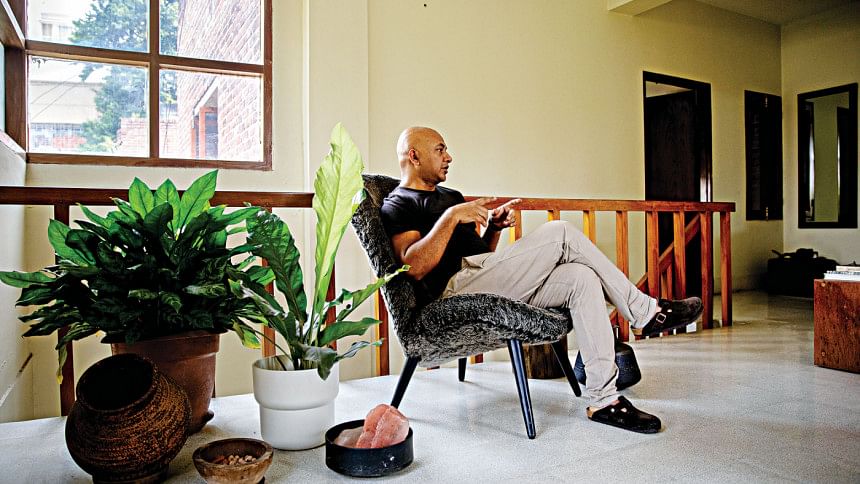
Khaled Mahmud, an artist and entrepreneur, embodies thoughtful consumption in every aspect of his life, whether at work or in his personal space. His ventures, MIB Spirit—Made in Bangladesh—and Ajo Idea Space are renowned for their sustainable approach. During a tour of his home, Khaled shared stories about each corner and the philosophy that influences his journey.
"Designing is a continuous process, much like improvisation. Designers need to stay inspired. This task is never fully resolved in one attempt. As people's moods and the environment evolve, it becomes impossible to adorn something permanently," Khaled Mahmud explained while sitting in his living area, which opens onto a rooftop brimming with greenery.
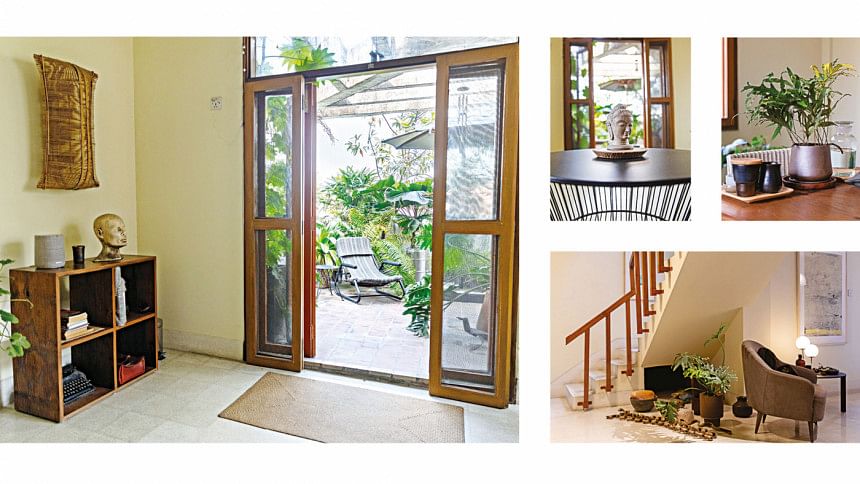
When it comes to styling a living space, he believes it should evolve gradually and continuously, much like the way we cherish life each day. "You create stories in every corner of your home, akin to writing a diary. If you design without thinking, you are merely decorating—it has no soul. We can immerse ourselves daily in designing specific spaces within our homes," he added.
The home Khaled currently resides in, connects deeply with his soul, a connection he attributes wholeheartedly to the architect. "Having a connection with a specific space is an essential element. This building, designed by Bashirul Haq, is a responsible creation. Each corner of this house is adorned with artefacts collected from across the country, seamlessly incorporating recycling. This style is incredibly relevant for the times we live in," Khaled explained.
When it came to gardening, Khaled focused on managing heat, as his apartment is located on the top floor. He admitted that he was not particularly inclined towards greenery before moving to this space. "This home, this place, has transformed me into a green person. There is a popular saying, 'Growing plants is not for everyone.' Previously, I felt the same, perhaps because I was in the wrong environment. After moving here, every plant I've cared for has flourished, thanks to the ideal conditions, especially the abundance of light," he shared.
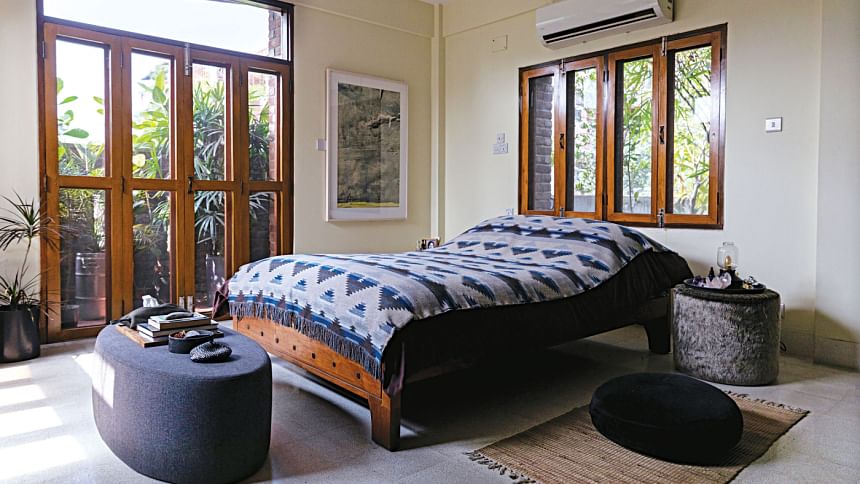
Regarding local plants, Khaled observed that while they might not be overly ornamental, they possess a unique beauty of their own. Proper care can make them an affordable and sustainable option, especially since decorative plants can often be quite expensive.
His vivid explanation further emphasised that not all furniture blends well with plants. "All these pieces are from my designer line, Srijo, a venture I started that focuses on upcycling designs from garment waste," Khaled said.
The sofa I was sitting on while speaking with him was made from garment waste, commonly used as the cover material for pilot jackets. He elaborated, "The material is very sturdy. The essence of this piece of furniture is that everything is handmade and crafted from repurposed materials. Each corner of this house is designed with artefacts collected from across the nation, incorporating them with recycling. This style is highly relevant for the present time."
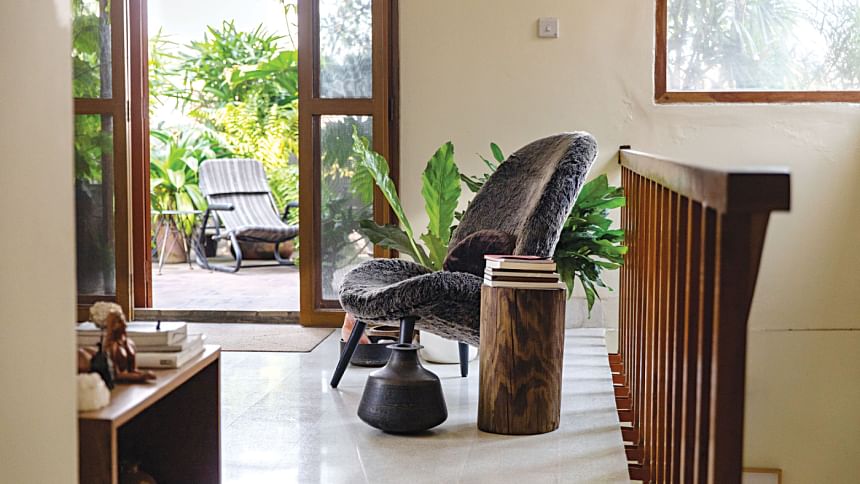
Pointing to a hanging piece made from cane, traditionally used for catching fish in rural areas, he remarked, "I bought this from a village market for around BDT 300. The painting below is by Mainul Islam. Both are aesthetically unique in their own way. The wooden shelf is made from reclaimed shipwood. Interior design should focus on creating aesthetics without excessive expense. There is a connection between beauty and money. If you are creative, you are not poor but rather rich in aesthetics," he added.
"A few hundred years ago, people in this region, living in rural settings, enjoyed a high standard of living at an affordable cost. They were surrounded by greenery and water resources. Interestingly, they designed everything themselves," he said. "We used to design everything, from homes to furniture. The entire living system was within our control. Once this responsibility shifted to industries, our options became limited."
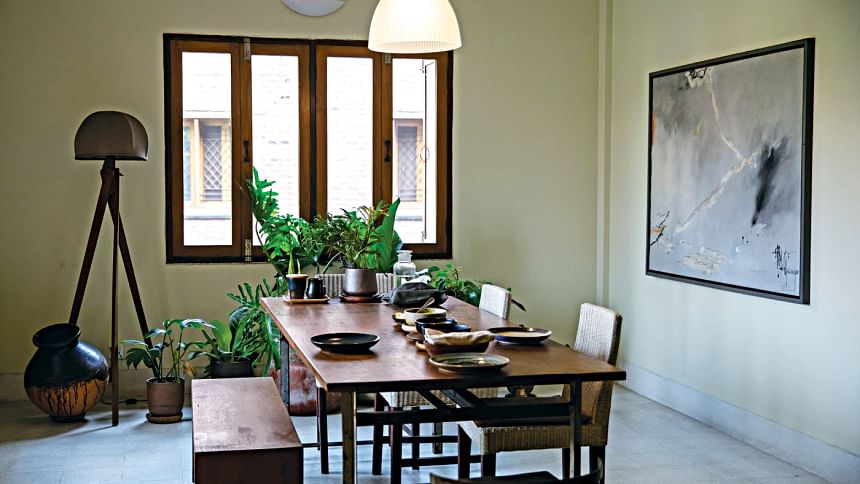
Khaled believes a Bengali house should reflect its own aesthetics, interweaving culture, traditions, and artefacts. He further noted that even one's profession leaves an imprint on their interior design. "A poet's home must embody the poet's identity; an architect's house must carry the architect's essence. Up until the 1980s, such aesthetics were prevalent in our society, and they were invaluable," Khaled expressed.
Among Khaled Mahmud's collection as a passionate antique collector is a three-hundred-year-old bowl once used for offerings, now placed in the living space on his first floor. He explained, "Pottery symbolises our history. The beauty of such antiques is irreplaceable, yet they are rarely appreciated in Bangladesh. I have collected a few antique pots that escaped being melted down to create new crockery."
Khaled reflected that one should design their home as they wish to design their life. "If this requires certain studies about architecture, then go for it. Instagram offers countless options for furniture design that can spark your creativity. Approach this as a passion and a hobby," he added with a smile.

 For all latest news, follow The Daily Star's Google News channel.
For all latest news, follow The Daily Star's Google News channel. 



Comments